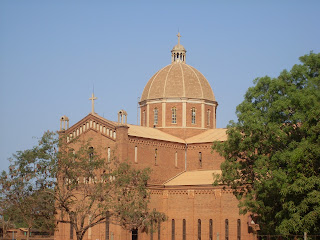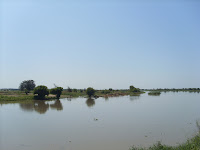 |
| Elaine as Sacajawea |
 |
| A Hooded Vulture at the Riverlodge |
It started with the Explorers barbecue on Saturday night, at what is going to be the new aparthotel - the Marula village - named after the trees they have planted there. You were supposed to go as a famous explorer so I acquired a couple of feathers from the local vultures and went as Sacajawea the Indian guide.
After a lazy breakfast on Sunday I wanted to go exploring! Beautiful Wau is famous in Sudan for 2 things - the largest brick built building in Southern Sudan and two sets of traffic lights! In all the time I've been here I've never seen the lights working. Andrew assured me that they were sometimes on but...
Anyway as it was my last Sunday I wanted to visit the market and try and get a photo of the RC cathedral - the largest brick building in Southern Sudan.
 |
| The airport road in Wau |
On our way to the cathedral we had to pass through the traffic lights which were working!! We assumed the Governor was worshipping at the cathedral so they had switched the lights on.
 |
| Wau Roman Catholic Cathedral |
 |
| Exhausted after volleyball! |
There are so few white people around on foot that we caused great excitement. I'm so sorry I couldn't take photos but you can't capture the smells and the noise of the market on film anyway.
We met some friends at Asmara for coffee then back to the Riverlodge for pizzas and what seems to be the traditional Sunday afternoon volleyball session - again I volunteered to fetch the ball and take photos!













